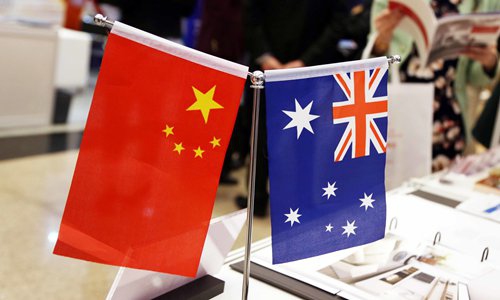Be prepared for a long-term bumpy road of China-Australia ties
Source: Global Times Published: 2020/8/11 14:08:40

China Australia File photo
Australia's anti-China hawks have been increasingly attacking people who support a closer relationship with China, labeling them as "China sympathizers" or "apologists." There is a growing trend in Australia that does not tolerate rational voices toward China.
This trend of "political kidnapping" in rhetoric reflects, in the first place, that Australian society is following US footsteps closely. Given the tensions between China and the US, Aussie politicians have to toe the line with Washington, so as to allow their political careers to continue. Similarly, some mainstream media outlets in Australia have a broad Western background (and of course, an American background). Therefore it is very clear to whom those outlets speak for.
In such a context, relatively rational voices will draw criticism easily. Even Marise Payne, Australia's foreign minister, who is not pro-China, has caused controversy within Australia due to her China-related remarks during this year's Australia-US Ministerial Consultation. What she said was just a fact, "The relationship we have with China is very important."
The hyping-up of anti-China rhetoric in Australia has transmitted a dangerous message. It is very problematic for a society to squeeze out room for rational, neutral, and objective words and ideas. If this trend does not ring enough alarm and is not curbed in time, the ghosts of McCarthyism could haunt again. This is very risky.
Trade is the foundation of Australia's nationhood. If there is no international trade, Australia cannot survive. However, Canberra and Washington are not economically complementary. Therefore, Australia needs to maintain its economic vitality and growth through trade with emerging Asian markets. This is why Australia is one of the supporters of the Regional Comprehensive Economic Partnership.
According to the Australian Bureau of Statistics, almost half of the country's exports in June were to China. This revealed the gravity of China-Australia trade relations. However, there is a "toxic climate" in Australia, in which business attempts to bridge differences with China to safeguard Australia's interests will be labeled as pro-China. Business leaders believe it is not in their country's national interest for such a climate to exist. But they are not willing to call it out at the risk of being labeled pro-Beijing.
Many of Australia's anti-China hawks are aware of this reality, but they are politicians rather than statesmen, so they lack strategic insight and care only for immediate interests. They speak for people who fund them. It is not in their consideration whether their words and deeds will severely jeopardize their own country in the long run.
Former Australian diplomat Gregory Clark believed that the responsibility for countering the increasingly prevalent anti-China stance within Australia does not lie with businesses, but the government, which should offer an "unbiased" way to understand China. But in the short term, it is hard to see the Aussie government coming up with something in this regard.
Canberra has a close relationship with Washington. Hence, when China-US ties are stable, China-Australia ties follow suit. As the US continues to find fault with China currently, the Australian government will of course emulate it.
Besides, deep trade ties with China have frightened Australia. International relations theory believes that the deeper the two countries are linked, the more vigilant they will be toward each other.
We wish China-Australia ties can evolve steadily but we need to remember that our relations with Canberra have never been rosy all the way through. From the 9/11 attacks until the China-Australia Free Trade Agreement signed in 2015, the two countries' relationship developed rapidly. But if we turn the clock back to the late 1990s when there was a crisis in the Taiwan Straits, we see that China-Australia relations were bumpy in that period.
With such being the case, we shouldn't take for granted that the world is peaceful because we have lived in peace for years. When we continue pushing forward our relations with Australia, we should also prepare for the long run. On the one hand, China needs to reduce its relatively high reliance on Australia in areas such as iron ore imports; while on the other, we need to be prepared for the reality that our relations with Canberra will probably be on a long-term bumpy trajectory.
The article was compiled by Global Times reporter Xu Hailin based on an interview with Yu Lei, chief research fellow at the Research Center for Pacific Island Countries, Liaocheng University and a research fellow at the Australian Studies Center at Beijing Foreign Studies University. xuhailin@globaltimes.com.cn
Posted in: VIEWPOINT,OTHER REGIONS